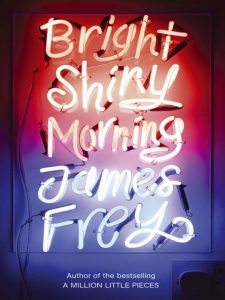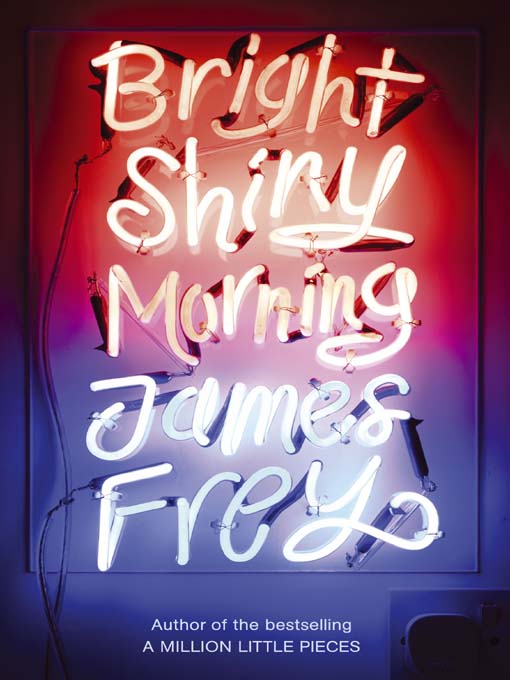by Alex Watkins (News Editor) – Email
 Sparsely, oddly punctuated and fraught with expansive sentences in a style identical to his previous works, James Frey’s Bright Shiny Morning reveals his relentlessly dark worldview, in which the American Dream is a laughable illusion, and the down-on-their-luck “good guys” rarely get what they deserve.
Sparsely, oddly punctuated and fraught with expansive sentences in a style identical to his previous works, James Frey’s Bright Shiny Morning reveals his relentlessly dark worldview, in which the American Dream is a laughable illusion, and the down-on-their-luck “good guys” rarely get what they deserve.
The aim of the work seems clear if ambitious: Frey wants to blow the lid off Los Angeles, exposing its seamy underbelly and all of the intermingled beauty and pain to be found in it. He contrasts tales of glamour and opulence with those of desperate wanting, painting a picture of a city that both crushes dreams, and – for the lucky few – makes them.
Admittedly, I was hesitant to embrace Frey’s novel as an honest and open exposé of LA at its grittiest from the very beginning; given Frey’s very public humiliation when an investigation by The Smoking Gun that revealed that a large portion of his “autobiographical” A Million Little Pieces – a tale of his supposed descent into addiction and his subsequent triumph over his demons – was outright fabricated, one could reasonably approach his latest offering with a healthy amount of skepticism. But Frey makes it clear that this is a work of fiction, perhaps superfluously stating that “Nothing in this book should be considered accurate or reliable.”
Many of the characters are one-dimensional and expose Frey’s quaint, upper-middle class-turned-rebel bias: the rich characters are all cruel and immoral, and the poor are all hardworking and decent. Perhaps the problem is this: even at a deceptively lengthy 501 pages, there are simply too many characters for the reader to get an intimate understanding of all of them. Several main threads run through the story – we follow the exploits of Amberton, an obsessive and depraved movie star who is secretly gay and who seeks the affections of a former football player at all costs – even against the man’s will. Another main focus is the story of Esperanza – the child of two illegal immigrants – who possesses miraculously large thighs, and who earns money for college working as a maid for a singularly monstrous and extremely wealthy old woman; she puts on an accent and pretends to barely speak English in order to allow this elderly tyrant to feel superior.
Perhaps the most touching (though still clichéd) characters Frey crafts are the young couple who escape Ohio and their abusive families to seek a new life in Los Angeles. Far less inspired is the story of Old Man Joe, who wanders the boardwalk and devotes his life to drinking Chablis; within the first few pages of the novel, Frey presents a very contrived image of this prematurely aged, homeless man “standing on the beach screaming at the sky, which was eternal, black and silent.”
These main threads are intermingled with brief glimpses into the lives of other typical LA residents: the unnamed woman who goes on a date and is raped, only to later have her attacker serve her – smiling – at a fast-food restaurant, or the beautiful girl who comes to L.A. to become an actress and instead ends up becoming an escort.
Though sometimes shocking in the extent of their violence and misery, the successive stories are not revelatory; they are the predictable, largely depressing “realities” that we have already seen played out on the big screen and in other books so many times before. That said, it is not without its moments. One particular gem is the tale of Larry, “A mean-ass motherfucking hater” who despises all people and races equally, and who sells guns, delighting in the knowledge that they will one day be used to kill people.
As a child, Larry tells his mother that “If [he] was given the choice between shooting a white motherfucker and some motherfucker with pigment in his skin, [he’d] line ‘em up back-to-back so [he] could shoot ‘em both with one bullet.” When she comments on how intelligent she thinks this statement is, he tells her “to shut the fuck up, that he [hates] her too.”
Big Shiny Morning is the literary equivalent of a blockbuster movie, with all the requisite scandal, heartache, glamour, and intrigue. The work is often largely and guiltily entertaining, though it feels inauthentic, and the thinly-veiled attempts to evoke an emotional response become tired. The book probably won’t change your mind about Frey – and it certainly won’t change your life – but it could easily serve as a diversion, in the vein of the trashy Hollywood offerings it so often mimics.


